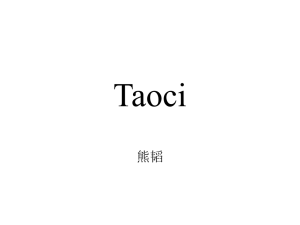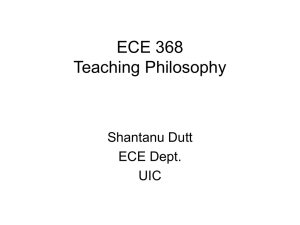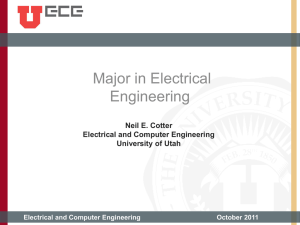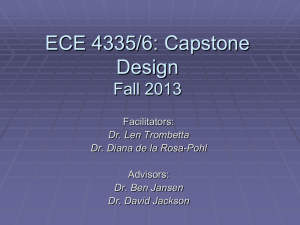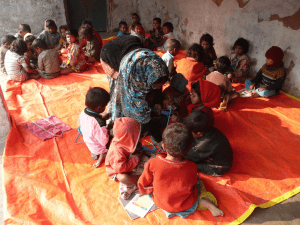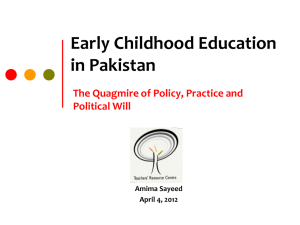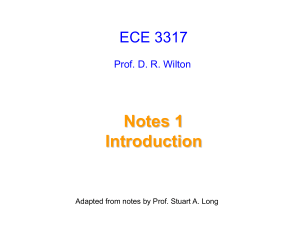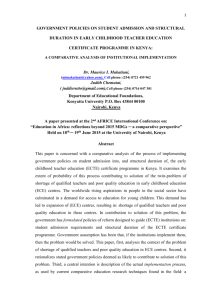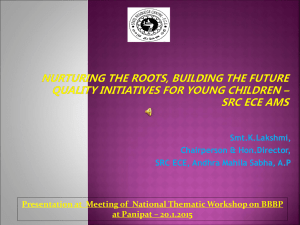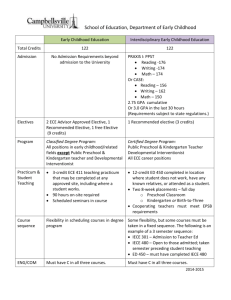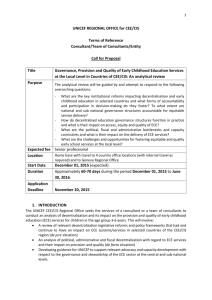Lecture1_v2 - NZ
advertisement
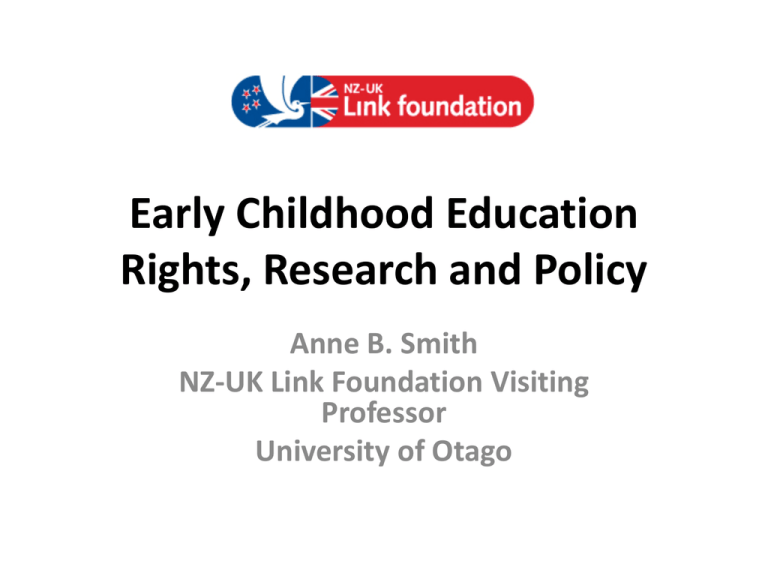
Early Childhood Education Rights, Research and Policy Anne B. Smith NZ-UK Link Foundation Visiting Professor University of Otago Early Childhood Education Rights, Research and Policy Anne B. Smith NZ-UK Link Foundation Visiting Professor University of Otago Definition and Value • Rights are claims that are justifiable on legal or moral grounds (James & James, 2008) • They provide rights holders with respect and are a resource for child advocates • Rights-holders can exercise agency – agents make decisions, negotiate with others, change things (Freeman, 2011) Respect for children “Not only is the Convention a nearly universally adopted expression of respect for children as persons, but it is also unparalleled in its conceptual breadth. No other human-rights treaty directly touches on so many domains of life”. (Melton, 2005, p. 648). United Nations Convention on the Rights of the Child • Children should have be provided with education that helps them meet their potential - ‘the development of the child’s personality, talents and abilities‘(29) • Children should be protected from harmful, neglectful or abusive treatment (19) • There should be no discrimination on grounds of gender, SES ethnicity, disability (2) • Children have a right to survival and development (6) • Children should have a say in their own lives, and access to information (12 and 13) Challenging Dominant Constructions • Constructing children entirely as dependents denies them the chance to act for themselves; • Children are resourceful as well as vulnerable; • Position children as authoritative knowers transfer of learning, persistence, engagement (Carr, Smith, et al, 2010 Learning in the Making). New Lens on Childhood FROM Passive recipient of adults’ teaching, protection and care TO Children as social actors and active participants in constructing their own lives Theoretical Perspectives • Move from Developmental Psychology – Normative approach – Children as vulnerable objects of concern – Universalizing claims • Emergence of interdisciplinary field of Childhood Studies • Links with sociocultural theory – – multiple cultural pathways to learning, – context of social relationships and interactions, – guided participation towards agency ECE Policy in NZ – 1986- 2008 • an integrated system of education and care • a bicultural, holistic, socioculturally-oriented curriculum (Te Whāriki); • innovative assessment (Learning Stories) • a strategic plan (Ngā Huarahi Arataki) – improving participation and quality • the 20 hours ECE for 3 and 4 year-olds policy 1. Integration 1986-1987 • Division of preschool (education for middleclass children)/childcare (care for children whose parents ‘had to’ work) • Integration of ECE under Education Dept • Integrated 3 year training (benchmark) • Unified funding and regulatory framework Role of Research and Rights • Right of child to a quality ECE regardless of age, mother’s work status, or hours • Visits by Urie Bronfenbrenner, Bettye Caldwell (developmental psych but sociocultural) • US longitudinal studies (Perry, Abecedarian, Syracuse studies) • Shaped arguments that ECE had a lasting effect on child’s well-being and was a useful investment. 2. Curriculum and Assessment in ECE • Te Whāriki (Early Childhood Curriculum) is oriented towards encouraging autonomy, exploration, commitment and communication • Emphasis on learning rather than performance - meaningful problem solving rather than skills • Children are valued as active learners who choose, plan and challenge • A climate of reciprocity and ‘listening’ to children - how their feelings, curiosity and interest are engaged Assessment: Learning Stories • Formative assessment - ethnographic, interpretive and narrative methods • A holistic transactional model encouraging children to become competent and confident learners • Focusing on dispositions • Inclusion of parents’ and children’s voices Including the Child’s Voice “ Assessments that include the “child’s voice” or children making a contribution to their assessments encourage an orientation towards learning goals…. Teachers who pay careful attention to children’s voices gain windows into their world views and assumptions”. (Carr, et al. 2005, p. 3, p. 4) Outcomes of This Approach • Teachers have positive belief in children’s competence • More involvement and support from families • Teachers grow in confidence and willingness to try out new things • Children ‘own’ their own learning “Everyone waits with bated breath as they hear stories they have heard so many times before but never lose interest in hearing again” (Carr et al, 2004 Role of Research and Rights • Rights incorporated into philosophy: – voice, agency, participation; • Informed by ecological and sociocultural research (Bronfenbrenner, Bruner, Donaldson); • Warm engaging relationships (Howes & Droege,1993; Greenberg, 1992) – not formal instruction; • Qualitative research contributed to resource development (Podmore, Carr), evaluation projects looked at outcomes (Linda Mitchell). 3. Early Childhood Strategic Plan • Meade Working Party (2000) recommended; – Universal entitlement to free, high quality ECE – Review of regulatory and funding systems • Widespread consultation with EC sector • Government response - Pathways to the Future: Ngã Huarahi Arataki 2002-2012 Three Goals • Increasing participation in quality ECE services; • Improving quality of ECE services; • Promoting collaborative relationships. Key changes • Dramatic increase in funding (doubled since 2007 and trebled since 2004); • Moves to a qualified EC workforce (currently 75.3%); – By 2007 50% will be registered teachers – By 2012 100% will be registered teachers • Review of funding and regulations – Better ratios and group sizes • 2004 government promised 20 hours of free ECE for all 3-4 year-olds Role of Research and Rights • Rights philosophy incorporated in SP Working Party Report – right of every child to free high quality ECE; • Literature review on Effects of ECE (Smith et al, 2000) commissioned by MoE – informed TW; • NZ longitudinal study Competent Children Competent Learners. Outcomes of Policies • High participation rates in ECE – from 92% in 2002 to 95% in 2012, 90.9% for Māori, 86.8% for Pasifika; • Shift to longer hours – 40% enrolled for 20 hours or more; • 2008 UNICEF report – NZ 6th highest in OECD for participation rates; • Improvements in quality (Mitchell, 2011), NZ rated 9th out of 45 countries for affordability. A Side Effect of Policies • Rapid expansion of private-for-profit centres (identical entitlement to funding); • Growth of 47% private services (2007 to 2011), compared to 2.8% in community sector; • Profits to owners or to shareholders; • Poorer salaries, working conditions, services located in higher income areas. Fiscal Restraint • National government comes to power in economic downturn 2008, they describe ‘blow out’ in EC funding; • Immediate cuts to: – – – – Professional development Centres of Innovation Goal of 100% qualified teachers Improvements in ratios. ‘Early Childhood Education Being Targeted by National For Funding Cuts’ 22/4/10 BUDGET: 20th May 2010 Childcare funding slashed Early childhood educators devastat Preschool costs to rise Budget launches attack on quality teaching for youngest learners Qualification and quality divides It is a matter of personal belief as to whether a high proportion of all centre staff should be trained teachers. John Key, Prime Minister, 2010 It is a matter of an informed and evidence-based educational decision. These questions would never be raised about adults who teach 5-6 (or older) year-olds in school…. We had hoped that 100% qualified teachers for all children in EC made us different from other countries ….and would contribute to the government’s aim of equitable and quality outcomes for children from all backgrounds. Margaret Carr and Linda Mitchell, Research evidence? There is no research evidence that centres with 100% qualified teachers are better than with 80% Anne Tolley, Minister of Education, 2010 • Such research would be hard to do. There are few countries that employ 100% qualified ECE teachers. There isn’t any research either which shows that 100% qualified staff isn’t better than 80% • Anne Smith, 2010 Recent Research (Meade et al, 2012) • To compare the quality of centres with 100% qualified staff and centres with 80% qualified staff. 100% qualified centres •More open-ended questions; •More engagement in sustained shared thinking; •Children more independent and more focused. Directions for change 2002-2012 2011 Labour: investment in inputs National: accounting for outputs Compulsory ECE for children of beneficiaries All beneficiary parents will be required to send their children to for at least 15 hours a week from age three - a way to ensure children of beneficiaries "get the best possible start in life". • flexibility for social sector agency staff to work with these parents to make suitable arrangements. • a graduated sanction system where parents would receive reminders of their obligations before losing half of benefits. Conclusions • A children’s rights perspective and UNCRC are important tools for change; • Including children’s voice builds better policies and practices; • Research is most helpful if there is political will; • Alliances between advocates for children and researchers essential.
